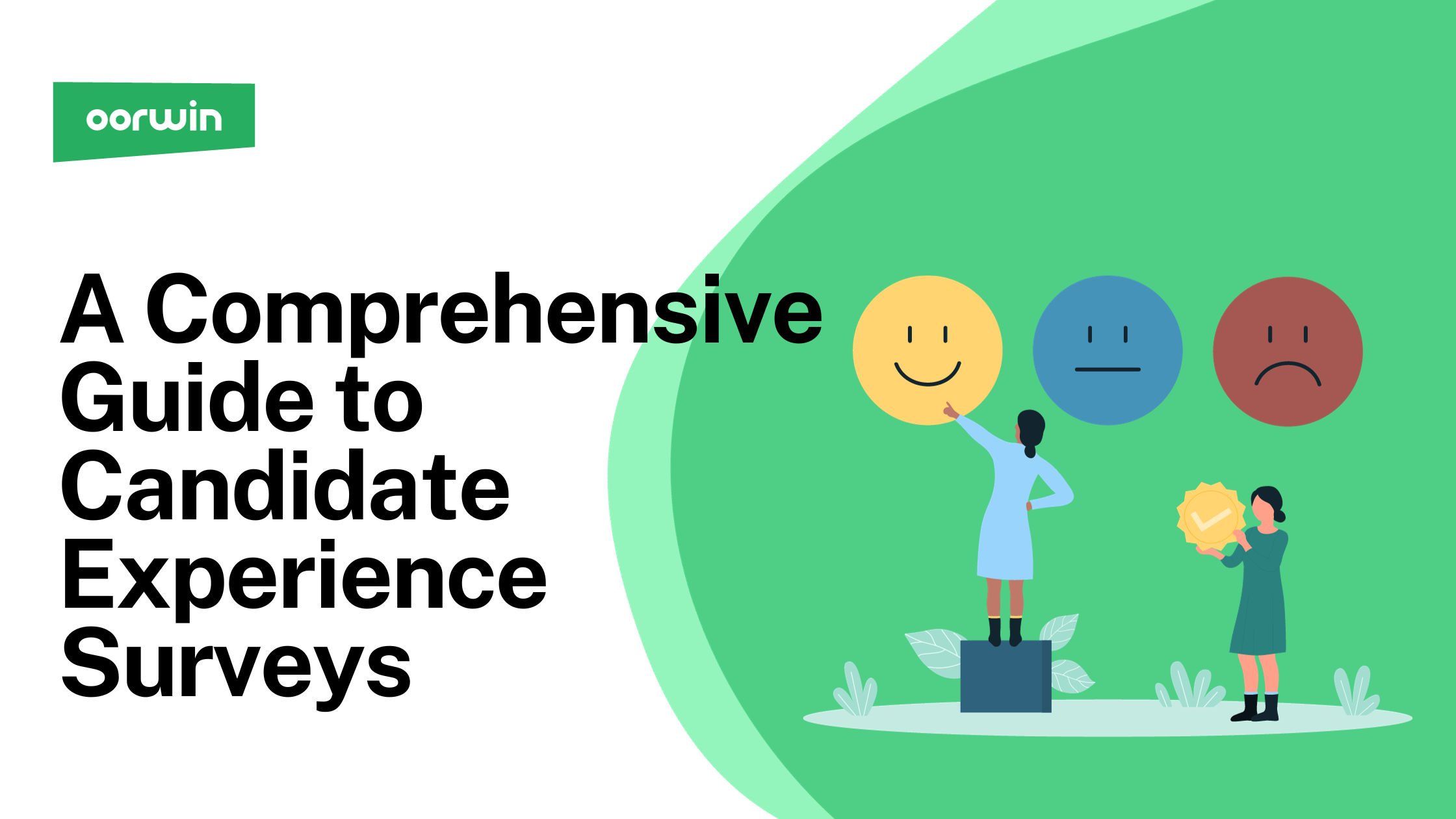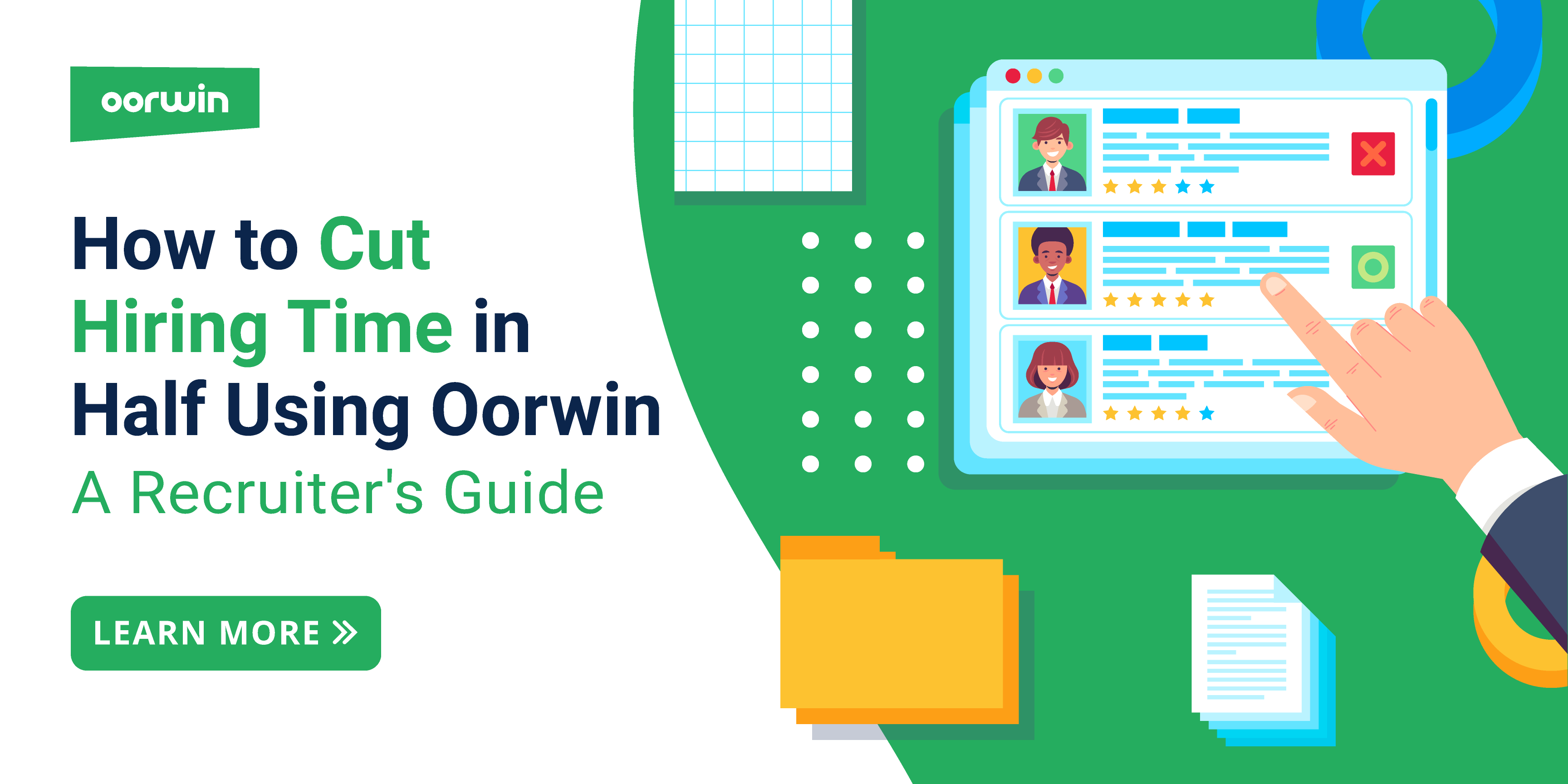A Guide to Candidate Experience Survey: Templates & Insights
Oorwin
6min read / 31 Oct 2023

Related Articles
A Comprehensive Guide to Candidate Experience Surveys
The candidate’s experience stands central to the success of modern recruitment strategies. As companies vie for top talent, understanding and optimizing the journey from application to onboarding becomes crucial. Candidate experience surveys emerge as powerful tools in this endeavor, offering a window into the applicant’s perspective. Through these surveys, organizations can gather direct feedback, identify areas of improvement, and ensure that their recruitment process aligns with the expectations of today’s job seekers. This guide delves into the nuances of crafting effective surveys, ensuring that you not only gather data but also actionable insights to elevate your hiring game.
What Are Candidate Experience Surveys?
Candidate experience surveys serve as a vital tool for organizations to extract insights directly from job applicants about their interactions and experiences during the hiring process. These surveys encompass everything from the clarity of the job advertisement to the responsiveness during the post-interview stages. By tapping into the candidate’s perspective, organizations better understand their recruitment strengths and areas that might need enhancement. This feedback loop not only aids in refining the hiring process but also reinforces the company’s commitment to valuing and acting upon the voices of its potential employees.
In a broader sense, these surveys help align the recruitment strategy with the expectations and needs of modern-day job seekers.
Why Measure Candidate Experience?
Gauging the candidate experience is akin to taking the pulse of your recruitment strategy. It provides invaluable insights into how your processes resonate with potential employees, allowing for continuous refinement and optimization.
The Impact on Employer Branding:
Your employer brand is shaped by the experiences you offer to candidates. A positive journey can elevate your reputation, drawing in the best talent. However, inconsistencies or negative encounters can ripple through the talent pool, potentially affecting future recruitment.
Evaluating the Candidate’s Journey:
Every interaction matters, from when a candidate spots a job listing to the post-interview phase. Assessing these touchpoints gives organizations a clear picture of the candidate’s journey, ensuring that each step is streamlined and impactful.
Gaining Honest Feedback:
Surveys open the door to candid conversations. They allow candidates to voice their feelings and perceptions, offering organizations a raw, unfiltered look into their recruitment practices.
Identifying Areas of Improvement:
Every feedback, whether positive or constructive, is a stepping stone towards perfection. By highlighting areas that require attention, surveys empower organizations to evolve, ensuring they consistently offer an unparalleled candidate experience.
Key Considerations for Crafting Candidate Experience Surveys
Crafting a compelling candidate experience survey is both an art and a science. It’s about striking the right balance between gathering comprehensive insights and ensuring the process is smooth for the respondent. Here’s a closer look at some pivotal considerations to keep in mind:
Keep it Concise:
In today’s fast-paced world, brevity is key. While gathering detailed feedback is essential, it’s equally important to value the candidate’s time. A concise survey ensures you get the insights you need without overwhelming or deterring the respondent.
Focus on Pertinent Topics:
Every stage of the recruitment process influences the candidate’s perception. Ensure your survey touches on these critical junctures, from the initial application to the post-interview phase, to get a comprehensive view of their experience.
Diversify Question Formats:
A varied question format not only keeps the respondent engaged but also allows for depth and breadth in feedback. While structured questions can provide quantitative data, open-ended ones can offer qualitative insights, painting a fuller picture.
Guarantee Response Privacy:
Trust is foundational. Assuring candidates that their feedback will be treated with confidentiality encourages transparency and honesty in their responses, leading to more genuine and actionable insights.
Provide Space for Additional Comments:
Sometimes, the most valuable feedback comes from unstructured comments. Allowing candidates to share their thoughts freely can unearth insights that might not emerge from structured questions alone.
Best Practices for Crafting Candidate Experience Surveys
Creating a candidate experience survey is more than just drafting questions; it’s about designing a tool that captures genuine feedback while respecting the respondent’s experience. These best practices ensure that your survey not only gathers valuable insights but also reinforces a positive candidate experience.
Establishing Defined Survey Goals:
Before diving into the survey creation, it’s essential to have clear objectives. Are you looking to understand the effectiveness of a recent change in the recruitment process? Or is it a broader assessment of the candidate’s journey? Having a defined goal ensures that the questions are aligned and purpose-driven.
Optimizing Survey Timing in the Recruitment Cycle:
The feedback’s relevance can vary depending on when you solicit it. Immediate post-interview feedback might focus on the interview experience, while post-onboarding feedback can offer insights into the entire recruitment process. Choose your timing based on the insights you’re aiming to capture.
Personalization:
A touch of personalization can significantly enhance the response rate. Addressing the candidate by name or referencing a specific stage in their recruitment journey can make the survey more relevant and tailored to their experience.
Feedback Review:
Collecting feedback is just the first step. Regularly reviewing and analyzing this feedback ensures that the insights gathered are translated into actionable strategies, continually refining the recruitment process.
Outcome Communication:
Transparent communication fosters trust. Share the broader outcomes or changes made based on the survey feedback with the respondents if feasible. It reinforces the idea that their feedback is valued and can lead to tangible improvements.
8 Essential Templates for Insightful Candidate Experience Surveys
Designing an effective candidate experience survey demands accuracy, pertinence, and straightforwardness. While the core objective remains consistent – to gather genuine feedback – the approach can vary based on the specific aspect of the recruitment process you’re focusing on. Here are eight meticulously designed templates covering the candidate’s journey, ensuring you capture every vital insight.
Template #1: Hiring Process Feedback
This template is designed to understand the candidate’s perspective on the entire hiring process. Questions might include:
- How clear was the job description?
- Were all the stages of the hiring process communicated effectively?
- How would you rate the efficiency of the hiring process?

Template #2: Interview Satisfaction Assessment
This template focuses on understanding the candidate’s perception of the interview’s structure, the interviewer’s approach, and the overall environment. Sample questions could include:
- How would you rate the clarity of communication before the interview?
- Were the interview questions relevant to the position you applied for?
- Did the interviewer make you feel comfortable during the session?
Template #3: Communication During Recruitment
Communication is key. This template assesses how well the company communicated throughout the recruitment process. Questions to consider:
- Were you kept informed about your application status?
- How timely were the responses to your queries?
- Was the feedback post-interview constructive?
Template #4: Application Process Evaluation
The application process can set the tone for the entire candidate journey. This template focuses on that initial experience. Potential questions include:
- Was the application portal user-friendly?
- Were the application instructions clear and concise?
- How would you rate the overall ease of the application process?
Template #5: Selection Process Insights
This template delves into the later stages of the recruitment process. Questions might encompass:
- How transparent were the selection criteria?
- Were you provided with adequate resources to prepare?
- How would you rate the fairness of the selection process?
Template #6: General Hiring Process Overview
A holistic view of the hiring process can be captured with this template. Questions to consider:
- How would you describe your overall experience with our hiring process?
- What stages of the process stood out, positively or negatively?
- Are there any recommendations you’d like to offer for improvement?
Template #7: Insights into company culture: candidate experience survey
The company’s culture heavily influences a candidate’s decision to join a company. This template aims to capture those perceptions. Sample questions include:
- How would you describe the company culture based on your interactions?
- Were company values evident during the recruitment process?
- How aligned do you feel with the company’s mission and values?
Template #8: Overall Recruitment Process Feedback
This comprehensive template seeks feedback on the entire recruitment journey. Questions might encompass:
- How would you rate your overall experience with our recruitment process?
- What aspects of the process would you highlight as strengths?
- Are there areas you believe need refinement or change?
Each template acts as a foundational guide, but customization is vital. Adapt them to align with your organization’s unique characteristics and objectives. The ultimate aim is to obtain insightful feedback that propels your recruitment approach forward, ensuring it remains effective and candidate-centric.
The Future of Recruitment: Prioritizing the Candidate’s Voice
The recruitment domain is in constant flux, and the candidate’s perspective is central to this transformation. Their feedback and experiences are becoming the cornerstone for shaping recruitment strategies. Companies that genuinely listen and adapt based on this invaluable input are poised to lead the way, redefining recruitment benchmarks.
By offering integrated solutions prioritizing candidate feedback, Oorwin empowers organizations to elevate their hiring processes, ensuring they remain competitive and candidate-centric.
Looking to bring a transformative change to your recruitment methods and place the candidate’s voice at the forefront? Delve deeper into Oorwin’s comprehensive solutions. By embracing these tools and strategies, you’ll be setting the stage for unparalleled recruitment excellence, ensuring both efficiency and candidate satisfaction. Start your journey towards redefining recruitment today.
Frequently Asked Questions
What are candidate experience surveys?
Candidate experience surveys are systematic questionnaires tailored to gather insights from job applicants. They delve into the applicant’s perceptions, feelings, and experiences throughout the recruitment process, offering companies a lens to view and refine their hiring approach.
What are the best questions for a candidate experience survey?
The most effective questions probe into the clarity of job descriptions, recruiters’ responsiveness, the interview process’s comfort and transparency, and the overall perception of the company’s brand and culture.
What should be kept in mind while crafting candidate experience surveys?
When designing these surveys, it’s vital to ensure clarity and brevity. Questions should be relevant and varied in format, from multiple-choice to open-ended. Guaranteeing respondent anonymity can foster candidness, and providing space for open feedback captures nuanced insights.
Popular Articles..
Blog

2min read / 25-Jun-2025
Master Effective Interview Techniques with Oorwin: A Step-by-Step Recruiter’s Guide
Blog
Blog
Get the latest Oorwin releases, updates, success stories & industry news
 Back
Back
